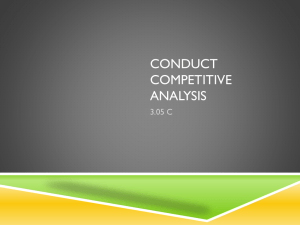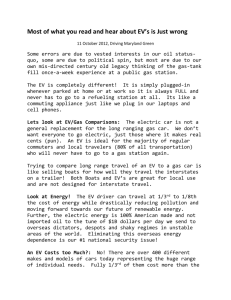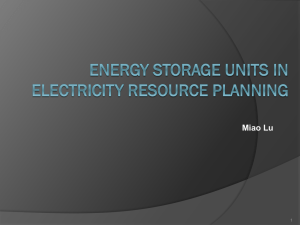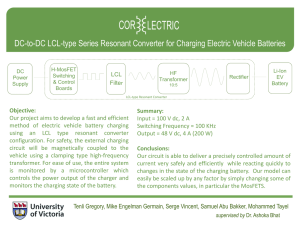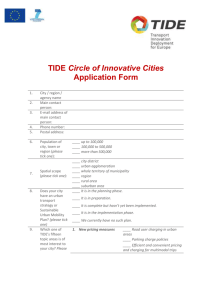Document 10752421
advertisement
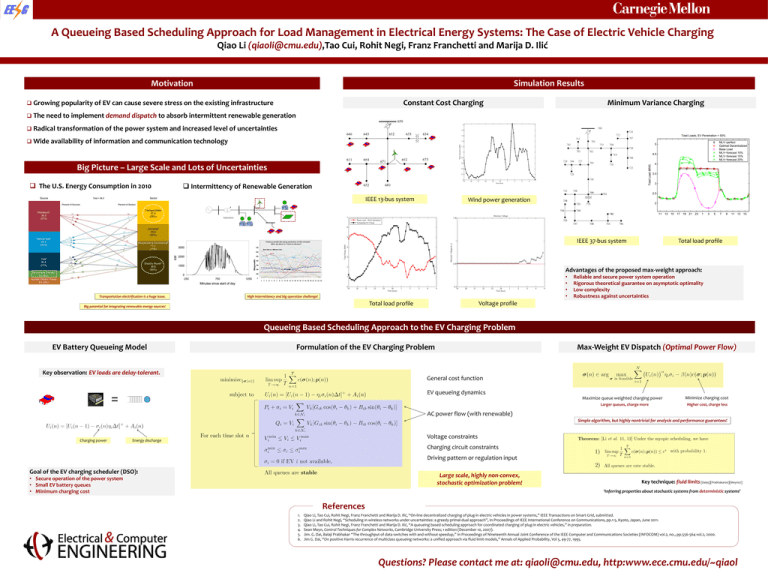
A Queueing Based Scheduling Approach for Load Management in Electrical Energy Systems: The Case of Electric Vehicle Charging Qiao Li (qiaoli@cmu.edu),Tao Cui, Rohit Negi, Franz Franchetti and Marija D. Ilić Simulation Results Motivation Constant Cost Charging Growing popularity of EV can cause severe stress on the existing infrastructure Minimum Variance Charging The need to implement demand dispatch to absorb intermittent renewable generation Radical transformation of the power system and increased level of uncertainties Wide availability of information and communication technology Big Picture – Large Scale and Lots of Uncertainties The U.S. Energy Consumption in 2010 Intermittency of Renewable Generation IEEE 13-bus system Wind power generation IEEE 37-bus system Total load profile Advantages of the proposed max-weight approach: Transportation electrification is a huge issue. • • • • High intermittency and big operation challenge! Voltage profile Total load profile Big potential for integrating renewable energy sources! Reliable and secure power system operation Rigorous theoretical guarantee on asymptotic optimality Low complexity Robustness against uncertainties Queueing Based Scheduling Approach to the EV Charging Problem EV Battery Queueing Model Max-Weight EV Dispatch (Optimal Power Flow) Formulation of the EV Charging Problem Key observation: EV loads are delay-tolerant. General cost function EV queueing dynamics = Maximize queue weighted charging power Larger queues, charge more Minimize charging cost Higher cost, charge less AC power flow (with renewable) Simple algorithm, but highly nontrivial for analysis and performance guarantees! Charging power Voltage constraints Energy discharge Charging circuit constraints Driving pattern or regulation input Goal of the EV charging scheduler (DSO): Large scale, highly non-convex, stochastic optimization problem! • Secure operation of the power system • Small EV battery queues • Minimum charging cost Key technique: fluid limits [Dai95][Prabhakar00][Meyn07] ‘Inferring properties about stochastic systems from deterministic systems’ References 1. 2. 3. 4. 5. 6. Qiao Li, Tao Cui, Rohit Negi, Franz Franchetti and Marija D. Ilić, “On-line decentralized charging of plug-in electric vehicles in power systems,” IEEE Transactions on Smart Grid, submitted. Qiao Li and Rohit Negi, “Scheduling in wireless networks under uncertainties: a greedy primal-dual approach”, In Proceedings of IEEE International Conference on Communications, pp.1-5, Kyoto, Japan, June 2011. Qiao Li, Tao Cui, Rohit Negi, Franz Franchetti and Marija D. Ilić, “A queueing based scheduling approach for coordinated charging of plug-in electric vehicles,” in preparation. Sean Meyn, Control Techniques for Complex Networks, Cambridge University Press; 1 edition (December 10, 2007). Jim. G. Dai, Balaji Prabhakar “The throughput of data switches with and without speedup,” In Proceedings of Nineteenth Annual Joint Conference of the IEEE Computer and Communications Societies (INFOCOM) vol.2, no., pp.556-564 vol.2, 2000. Jim G. Dai, “On positive Harris recurrence of multiclass queueing networks: a unified approach via fluid limit models,” Annals of Applied Probability, Vol 5, 49-77, 1995. Questions? Please contact me at: qiaoli@cmu.edu, http:www.ece.cmu.edu/~qiaol

